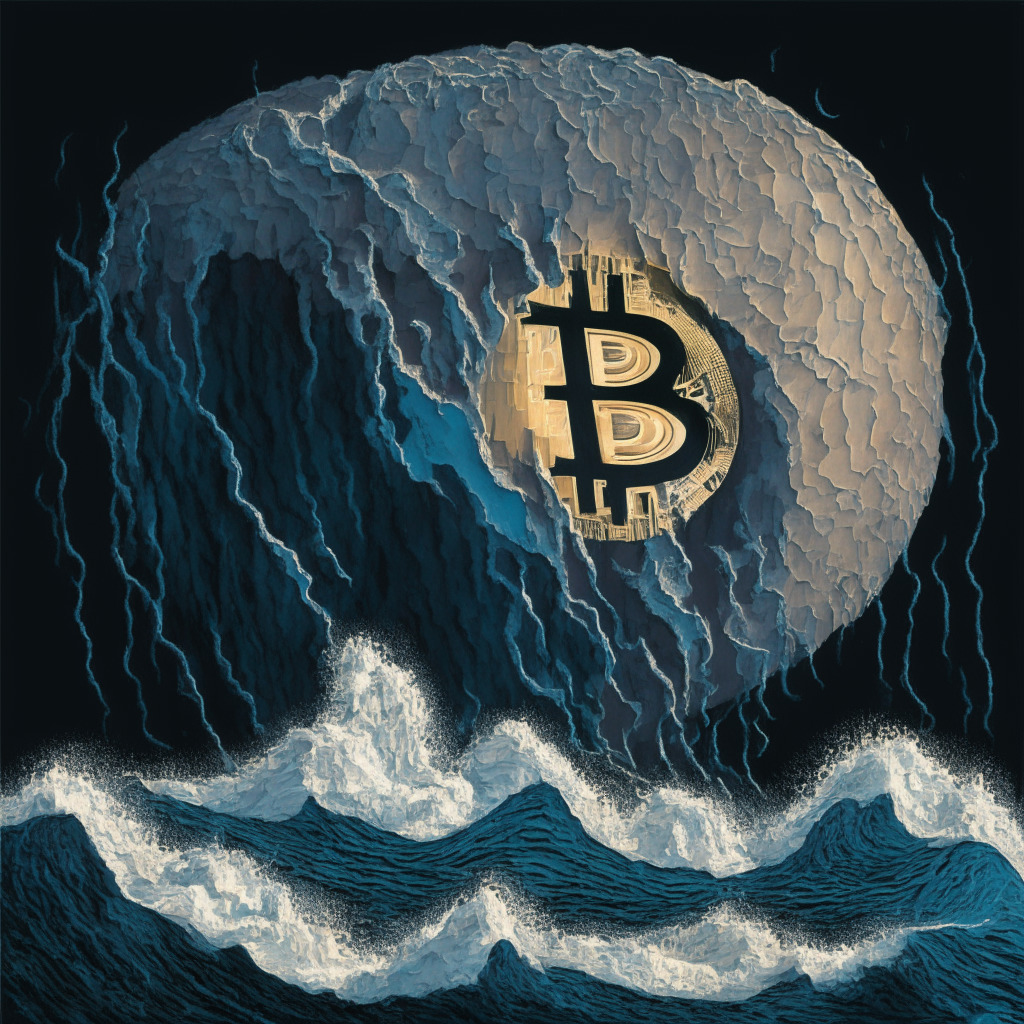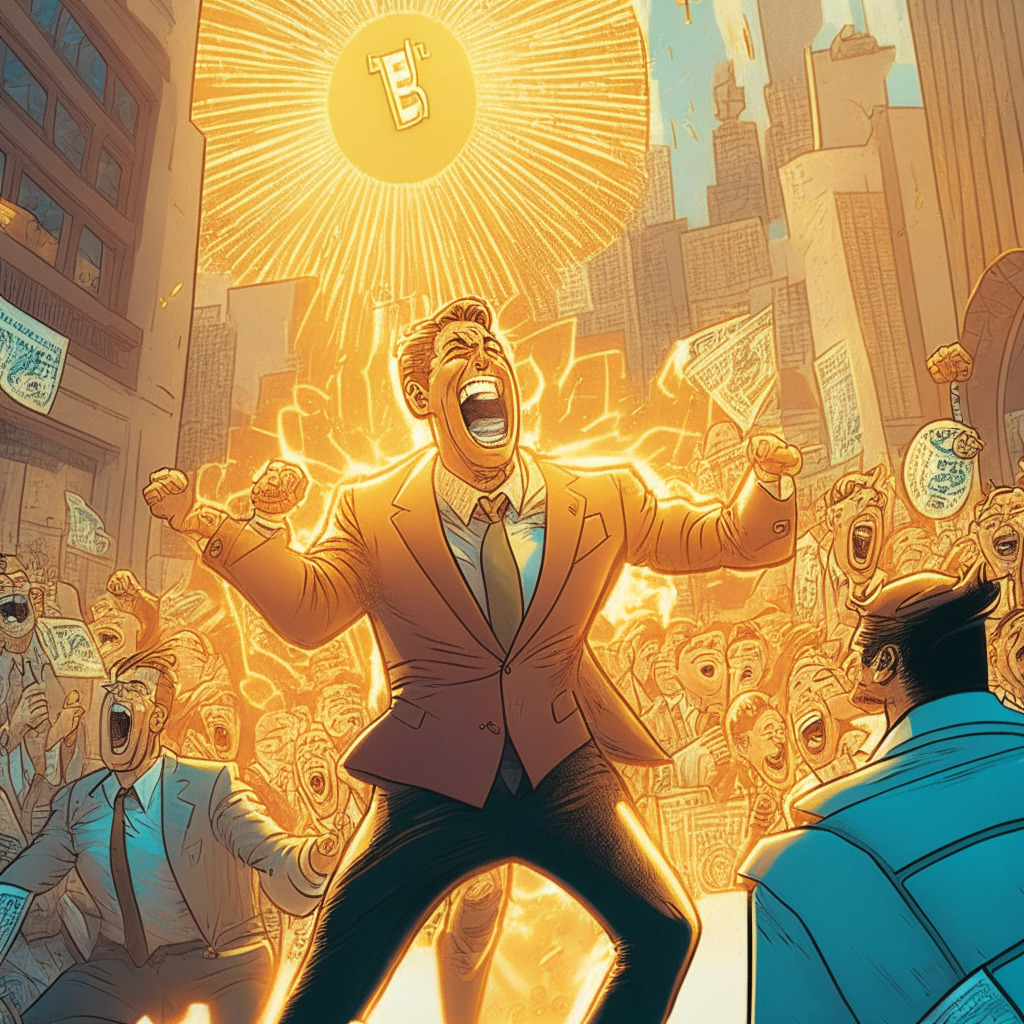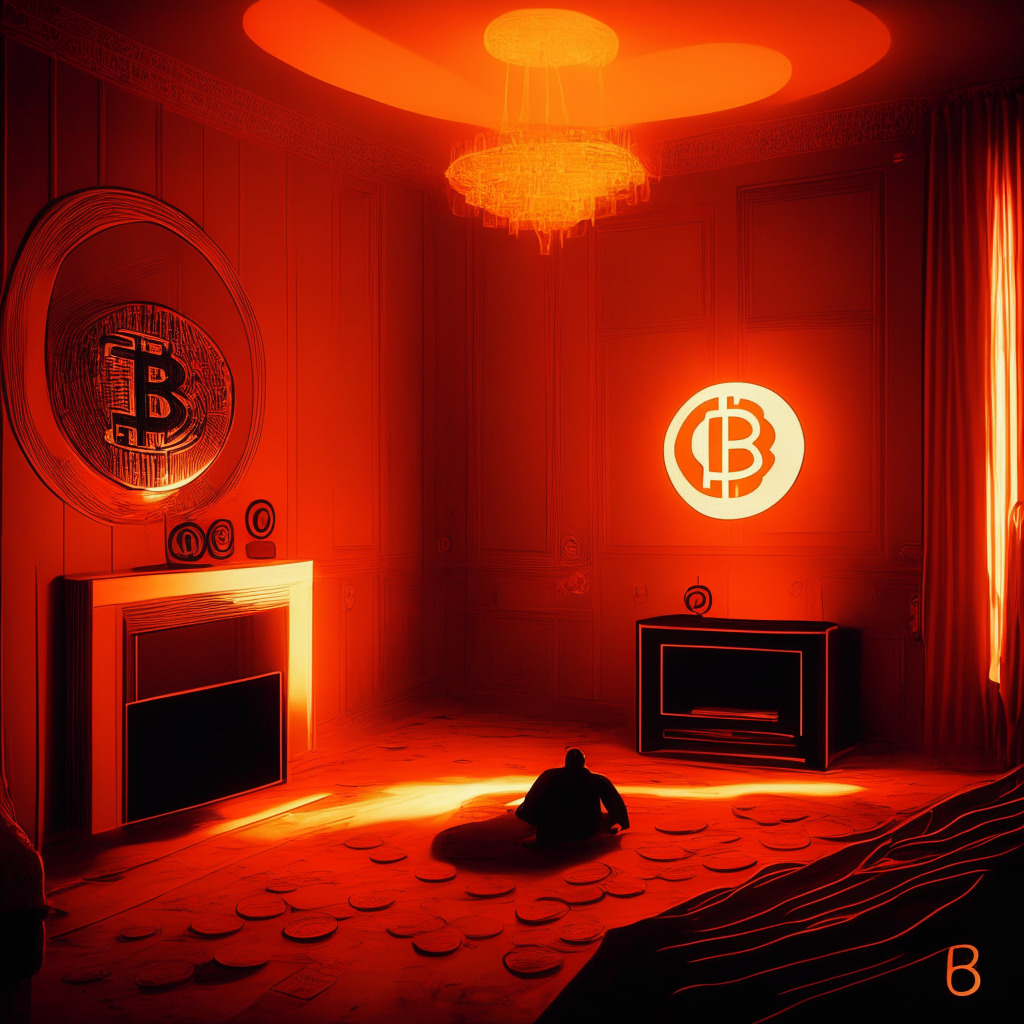“SAB 121, the SEC’s new regulatory bulletin concerning crypto assets, faces criticism and controversy. Issued without involving key industry bodies, this document has stirred skepticism due to its broad implications for digital asset custody, inherent risks, and the broader crypto space.”
Search Results for: Apple
Surviving the Crypto Bear Market: An Insight into the Inevitability of Web3 Revolution
“Web3 revolution signals an era of decentralization, authentic digital ownership, and self-sovereignty. Despite bear markets in the crypto sphere, projects with firm fundamentals and long-term visions prosper, contributing to a more inclusive, transparent digital future. Decentralization penetrates arenas like healthcare, entertainment, and supply chains, affirming the essentiality of this trajectory.”
AI and Creativity Clash in Hollywood: A Balance between Human Genius and Digital Progression
“The approved deal in the Writer’s Guild of America strike underscores AI can’t write or rewrite literary material, thus cannot affect a writer’s credit. Additionally, upon company consent and adherence to policies, a writer can use AI for writing services.”
Crypto Mining Meets Waste Gas Conversion: Tecpetrol’s Innovative Approach to Sustainability
“Argentinian oil company Tecpetrol plans to convert excess gas from drilling activities into energy for crypto mining. Tecpetrol expects to reduce environmental impact and generate profits. However, the ecological benefits and feasibility depend on the type of gas converted for mining use.”
Navigating Cybersecurity Challenges in the Cryptocurrency Sector: A Balancing Act Between Threats and Innovations
“The vibrant and rapidly evolving cryptocurrency sector experiences various cybersecurity issues, including phishing attacks, malware, and flaws in smart contracts. Despite blockchain and decentralized technologies bolstering security, these technologies present unique risks. To counter these, security experts advocate for cold storage solutions, strong passwords, two-factor authentication, and caution against phishing attempts.”
Swiss Bank Joins Crypto Exchange – A Bold Leap or Risky Venture?
“Hypothekarbank Lenzburg, a Swiss bank with over $7 billion in assets, will join the Central Securities Depositary of SDX crypto exchange. This expands the bank’s role in digital assets including token issuance, digital value rights listings, and custody, bolstering its presence in the thriving crypto market.”
Bitcoin Ordinals: Evaluating Impact on Network Efficiency Amid Rising Concerns
“The recent rise of Bitcoin Ordinals, a data inscription system, has raised concerns about network clogging and its impact on higher-value transactions. Contrary to this belief, a report by Glassnode found that inscriptions only occupy a fifth of Bitcoin’s transaction fees, indicating efficient blockspace use rather than significant displacement. However, Bitcoin Ordinals have amplified the demand for blockspace and operation costs for miners, potentially challenging miners’ profitability.”
Navigating the Crypto Conundrum: Striking Balance between Regulations and Decentralization
The article discusses the recent imprisonment of AirBit Club co-founder Pablo Renato Rodriguez, shedding light on the profound need for regulations in cryptocurrency. It emphasizes that while regulations can foster trust and protection for investors, they mustn’t undermine the innate decentralization and freedom of cryptocurrencies. The delicate balance between regulation and freedom is key for future industry growth.
Crypto Recognition in China: Bitcoin’s Status Shift and Its Implications for Global Finance
“Shanghai’s Second Intermediate People’s Court has legally recognized Bitcoin as a distinct, irreplaceable digital asset. This recognition contradicts Beijing’s blanket ban, hinting at a potential change in China’s cryptocurrency approach. The decision holds significant implications for regulation, global perception of cryptocurrencies, and the integration of digital currencies into traditional finance.”
Growing Uncertainty and Trust Issues in Crypto as Binance.US CEO Steps Down: A Deep Dive
Brian Shroder’s departure as CEO of Binance.US has led to widespread uncertainty, impacting crypto trust quotient. As crypto platforms grapple with trust and credibility issues, they face a challenging task: establishing security to ease investor worries. Only through earning investors’ trust can they shape a stable future.
Mixin Network’s $200M Security Breach: A Case Study in Blockchain Vulnerability and Recovery
Mixin Network’s founder, Feng Xiaodong recently disclosed a substantial $200 million hack on the network’s cloud service provider database. This breach resulted in the compromise of users’ digital assets such as Bitcoin and Ethereum. The company is introducing remedial measures including the issuance of “bond tokens” to offset the loss and boosting their security system. This incident resulted in a 9% dip in token value.
Bitcoin’s September Struggle: The Tussle between Promise of Growth and Gloom of Depression
Bitcoin market is grappling with uncertainty, experiencing fluctuating prices with no clear upward or downward trend. Market anticipation awaits U.S. Q2 GDP figures and potential inflation data, amidst mounting uncertainties. Traders point towards possibilities of Bitcoin plummeting further or bouncing back, while September’s performance adds pressure, leading up to October’s expectations.
Coinbase’s Huge BTC Holdings: Sign of Dominance or Call for Decentralization?
“Cryptocurrency exchange Coinbase reportedly holds 1 million Bitcoin, about 5% of total in existence. However, fears of centralized exchanges halting withdrawals have caused controversy. The company’s ongoing accumulation amid regulatory scrutiny also raises concern. Conversely, its holdings and financial performance highlight its industry dominance.”
Community Power in Cryptocurrency: A Close Look at Terra Classic’s Decision to Halt USTC Minting
“In the crypto world, community decisions often drive major changes. Recently, 59% of Terra Classic community voted to cease USTC minting due to its sharp value drop. This decision aims to restore USTC’s stability against the US dollar, with potential broader impacts on the global crypto market.”
Embracing the Meme Economy: Wall Street Memes Coin’s Impact on Crypto Trading Platforms
“The imminent launch of Wall Street Memes coin, $WSM, sparks interest as it aims to cash in on the meme stocks trend. The coin faces challenges from the rise of decentralized exchanges, despite simplified usage and cost-effectiveness of centralized exchanges like Binance. Investors must be prudent due to potential risks of volatility and unpredictability.”
Shifting Development Tools: ConsenSys Discontinues Truffle and Ganache for MetaMask Snaps and SDK
“ConsenSys, a leader in Ethereum software, has decided to discontinue key toolkits, Truffle and Ganache. The firm plans to focus on empowering developers through MetaMask toolkits. The transition involves an alliance with HardHat, support platforms for developers and the launch of innovative decentralized applications, MetaMask Snaps.”
Declining Dominance of Stablecoins: A Shift Towards Traditional Assets or a Chance for Recovery?
Despite a difficult year, the focus stays on the declining stablecoin sector, with major stablecoins like USDT showing consistent growth amidst the downturn. Factors such as legal action against major crypto exchanges and swings in stablecoin trading volumes due to the rush to list Bitcoin ETFs have impacted this fall. However, PayPal’s recent introduction of PYUSD could revive confidence in the sector. The future of stablecoins, while currently unstable, is still pivotal to the crypto landscape.
Surging US Yields and Shifting Macroeconomics: The Tug of War in Crypto Markets
Bitcoin (BTC), the largest cryptocurrency by market cap, cautiously operates within the $24,750-$28,500ish range, grappling with macroeconomic changes, institutional adoption issues, and a shifting regulatory landscape. Meanwhile, Ether (ETH) experiences a downturn, and traders explore volatility in low-cap coins. However, involvement with cryptocurrencies always carries high risk, and the information here doesn’t constitute investment advice.
LUNC’s Potential Comeback Vs New Entrant Meme Kombat: Steering Through the Crypto Wake
Terra Luna Classic (LUNC) saw a 9% leap after sanctioning proposals to strengthen its position and its stablecoin, USTC. However, LUNC’s overall performance has been inconsistent. Despite market indicators suggesting a potential rally, LUNC’s year-long depreciation cannot be ignored. Meanwhile, a new presale token, Meme Kombat (MK) offers additional investment opportunities.
Decoding the Legal Fray: Fenwick, FTX and the Boundaries of Crypto Accountability
“Fenwick & West, a Silicon Valley law firm, is accused of involvement in a fraud involving the insolvent crypto marketplace, FTX. The firm asserts its services were within legal realms and lacked awareness of fraudulent actions. The case underscores the complexities of cryptocurrency and brings focus on stakeholder accountability.”
From Ethereum’s Nostalgia to MetaMask Snaps: A New Dawn for Developers
Ethereum is witnessing the end of an era with Truffle and Ganache’s sunsetting. However, a new dawn lies ahead with MetaMask Snaps. These changes reflect Ethereum’s ability to evolve and adjust to new opportunities and challenges while promising an exciting future for developers.
Binance’s Stablecoin Delisting: A Regulatory Avalanche or Necessary Compliance Step?
“Binance plans to delist all stablecoins from its European platform by June 2024, complying with Europe’s tight regulation. The move, following the passing of Europe’s crypto regulation law, MiCA, could significantly impact the European crypto market. Meanwhile, the U.S. grapples with its digital currency dilemma, revealing distinct attitudes towards financial digitization.”
Ripple’s Liquidity Hub Expansion: Impact on XRP Demand and Diversification Into BTCBSC
“Ripple Labs plans to extend its Liquidity Hub platform to Australia and Brazil. The Hub serves as Ripple’s digital asset liquidity management service, currently supporting BTC, ETH, LTC, ETC, BCH, USDT and USDC, but not XRP. This hints at wider XRP adoption globally and is seen as a positive indicator, despite ongoing litigation with the SEC.”
Exploits, Ethics and the Attack on Curve: Examining the Undeniable Impact of Crypto Heists
In July, a $73 million exploit on Curve, a key decentralized finance player, impacted the wider DeFi platform’s asset-pricing system. A trading bot manipulated the vulnerability, inadvertently benefitting Coinbase, the Ethereum validator involved. Most of the stolen money was recovered yet left questions about asset recovery procedure after crypto heists.
Drama at JPEX: Raised Withdrawal Fees and Regulatory Clampdowns – Investor Crisis Ahead?
“The Hong Kong-based crypto exchange, JPEX, recently hiked its withdrawal fee to nearly $1K, following a warning from Hong Kong’s regulatory body. Critics argue the move may discourage users from withdrawing funds. Amidst accusations of unregulated services, the incident signals the need for a more adaptable regulatory framework in the crypto market.”
Regulatory Tightrope: Striking Balance between Crypto Transparency and Investor Safety
U.S. Sen. Sherrod Brown’s call to regulators for promoting transparency and safeguarding investor interests suggests a push for stronger authority over digital assets. This results in questioning the readiness of the crypto enthusiasts to embrace potential regulatory changes in the crypto realm.
Navigating the Crypto Liquidation Storm: A Harbinger of Opportunity or Doom?
“Shockwaves rippled through the cryptocurrency market as a liquidation cascade erased significant value back in August, causing one of the largest liquidation events in crypto history. The downturn also caused a substantial drop in VC investment inflow. However, the resilience of the $26,000 support level for BTC gives hope to optimists.”
Unraveling the Future of a Decentralized Economy: Pros and Cons of Crypto Finance
“Bitcoin and decentralized finance (DeFi) offer a financial alternative to conventional systems, providing a solution to issues like inflation and institutional insolvency. However, challenges like Central Bank Digital Currencies (CBDCs), centralized exchanges, and global instability could impact DeFi’s potential benefits”
Navigating Climate Change: The Intersection of Blockchain and Environmental Responsibility
“The Web3 ecosystem is progressively altering the blockchain narrative through the Ethereum Merge, which transitions from energy-intensive proof-of-work consensus to a greener, environmentally friendly proof-of-stake system. This change attracts eco-conscious activists, triggers innovation in regenerative finance, and encourages blockchain-based projects to offset their carbon footprint.”
Mauve: A New Dawn in Decentralized Exchanges and Tokenized Real-World Assets
“Mauve, a decentralized exchange, is among the first non-custodial exchanges legitimized as a virtual asset service provider by the Cayman Islands Monetary Authority. The exchange aims to trade compliant, real world assets, thus opening up avenues for secondary markets for on-chain real-world assets such as fixed income securities.”
Unregulated Crypto Exchange JPEX Warned: Hong Kong’s Tough Stance Sparks Global Debate
The Hong Kong Securities and Futures Commission warns unregulated crypto exchange, JPEX, that promotional activities without requisite licenses could lead to criminal charges. The SFC also scrutinizes JPEX’s aggressive promotions of high-yield savings products, and several misleading claims, including being a licensed platform, linked to potential deceitful practices in the growing virtual asset industry.
Navigating Celebrity Endorsements in Cryptocurrency: A Tale of Risk and Opportunity
“Australian F1 star Daniel Ricciardo and Olympic snowboarder Scotty James grappled with doubts when endorsing crypto exchange OKX, especially after the FTX debacle. Despite initial hesitations, they built trust over time through active steps taken by OKX to educate them about cryptocurrency.”































